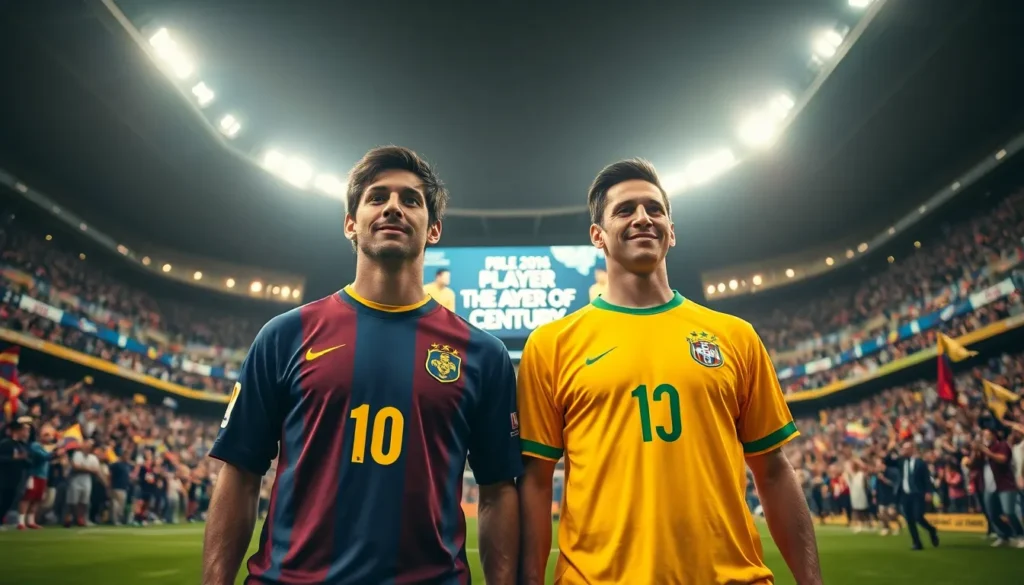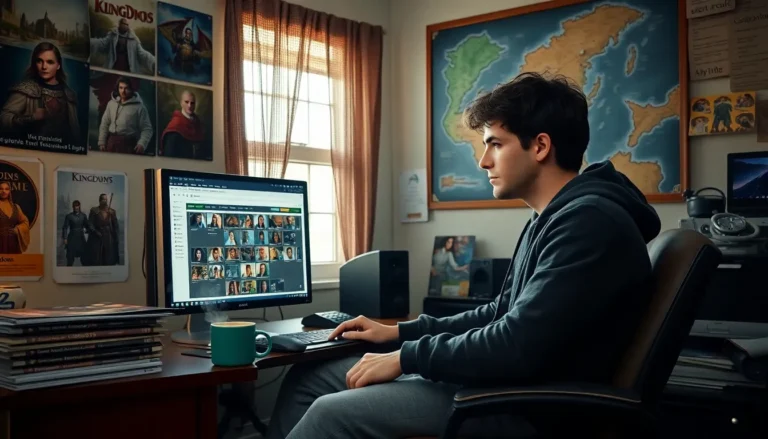Table of Contents
ToggleWhen it comes to the greatest of the greats in football, the FIFA Player of the Century award certainly takes the cake, or should we say, the trophy? Awarded once every hundred years, this accolade sends fans into a debate frenzy, with emotions running sky-high. In a sport where every goal can spark a celebration or a riot, this award is more than just a shiny piece of metal: it’s a legacy that defines the legends of the game. Buckle up as we kick off an engaging deep jump into the intriguing realm of football’s most coveted title.
The Origins Of The FIFA Player Of The Century Award

Launched in the year 2000, the FIFA Player of the Century award is a unique initiative designed to honor the outstanding contributions of footballers throughout the 20th century. It was the culmination of a century filled with thrilling matches, iconic goals, and unforgettable moments. The award aimed to celebrate the best male and female players who had left an indelible mark on the sport. This prestigious accolade was proposed by FIFA itself, making it a significant event in the world of football at the turn of the millennium.
Interestingly, the selection process involved both fans and football experts. While the details might seem foggy after two decades, one thing is clear: the award was part fan contest, part honorable recognition. It set the stage for what would become a legendary rivalry between the top footballers of the century. Clearly, such a title demanded more than just individual talent: it required a remarkable impact on the sport itself.
Criteria For Selection And Voting Process
The criteria for selecting the FIFA Player of the Century wasn’t set in stone, making it a bit of a guessing game. Candidates had to demonstrate exceptional technical ability, tactical intelligence, and the ability to have a lasting influence on football. Being a remarkable athlete wasn’t enough: candidates also needed to embody the spirit of the game and inspire future generations.
The voting process was as unique as the award itself. A mix of a select panel comprised of football experts and a public vote created a hybrid model that aimed to reflect both expert analyses and popular opinions. Fans around the globe could cast their votes, making it a highly participatory experience. With approximately 140 countries involved, the excitement was palpable. Hence, the winners weren’t just products of one country’s bias: they were celebrated and recognized on an international scale.
Notable Winners Through The Years
When exploring the winners of the FIFA Player of the Century award, one name that instantly springs to mind is Pelé. Earning the title as one half of the inaugural dual winners of the award in 2000, Pelé is often considered a game-changer. His flair, athleticism, and dazzling goals have left football fans mesmerized for decades. On the other hand, the equally iconic Diego Maradona provided inspiration and awe through his unique style and unparalleled dribbling skills.
Fast forward to the 21st century, and Lionel Messi entered the conversation. His phenomenal consistency, combined with his extraordinary ball control, makes him a fitting contender for discussions around who deserves the top spot. We cannot overlook Cristiano Ronaldo, whose goal-scoring prowess and determination have led him to break multiple records.
Each of these players has brought something distinctive to football, sparking debates and admiration for their respective legacies. Clearly, they represent not just individual excellence, but also the evolution of football as a whole.
Impact Of The Award On Global Football
The FIFA Player of the Century award has had a profound impact on global football, serving as a benchmark for greatness. It instilled a sense of pride among players and countries alike, motivating budding talents to dream big. Winning such a prestigious award provides validation that athletes often crave.
Also, the award connects generations of football fans. Older fans remember the likes of Pelé and Maradona, while younger audiences idolize Messi and Ronaldo. This generational impact unites fans across different eras, showcasing that football isn’t just a sport: it’s a cultural phenomenon that transcends ages.
Also, the award has driven competition among players. Aspiring footballers constantly strive for excellence in hopes of one day earning the coveted title, fueling a cycle of skill and ambition that enhances the sport globally.
FIFA Player Of The Century: Messi Vs. Pelé
The debate over who deserves the title of FIFA Player of the Century frequently boils down to two main titans: Messi and Pelé. Both have built extraordinary legacies, yet their contributions to the sport vary in style and context.
Pelé, with his three FIFA World Cup titles, is often seen as the ultimate team player who defined success in his era. His ability to perform under pressure made him a true champion, while his charismatic persona helped popularize the sport worldwide.
Conversely, Lionel Messi has dazzled the modern footballing world with his unmatched technique, agility, and intelligence on the pitch. His records have consistently eclipsed previous benchmarks, making the case for his own legendary status. The discussions around their inconsistencies, Messi’s lack of international silverware for much of his career versus Pelé’s unrivaled success, add a deeper layer to this rivalry.
Whether Pelé will forever hold the crown or if Messi will claim it in the years to come remains to be seen. Regardless, both players have cemented their places in football history.
Future Of The Award In The Modern Era
As football continues to evolve in the modern era, the FIFA Player of the Century award must adapt alongside it. The criteria for selection and voting processes may need revisions to align with changing dynamics in the sport. Factors like performance analytics, fan voting via online platforms, and the increased visibility through social media could provide a modernized approach that appeals to today’s audience.
Also, the growing presence of women in the sport offers the opportunity to give them equal recognition as deserving as their male counterparts. The focus on inclusivity could pave the way for a more comprehensive understanding of greatness in football, thereby enriching the award’s legacy.
Eventually, the future will depend on the balance between tradition and progress. If FIFA successfully adapts to the ongoing changes, the award can maintain its relevance and continue to inspire future generations of players.






